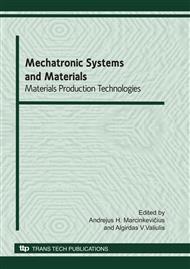p.382
p.388
p.394
p.400
p.404
p.410
p.414
p.419
p.425
Continuing Perfection of Industrial Engineering and Management Knowledge after Master Studies
Abstract:
Qualitative high education of a country is one of the most important factors that ensure a sustainable development of a respective country. Therefore effective development of higher education in the country becomes a significant factor in achieving this goal. Faster development of industry is mostly affected by the training of qualified industry engineers at higher education schools based not only on the conveyance of engineering, but also of managerial knowledge and the development of their abilities. The objective of this article is to put forward measures for improving continuing master studies in industrial engineering and management.
Info:
Periodical:
Pages:
414-418
DOI:
Citation:
Online since:
June 2010
Authors:
Price:
Сopyright:
© 2010 Trans Tech Publications Ltd. All Rights Reserved
Share:
Citation:


